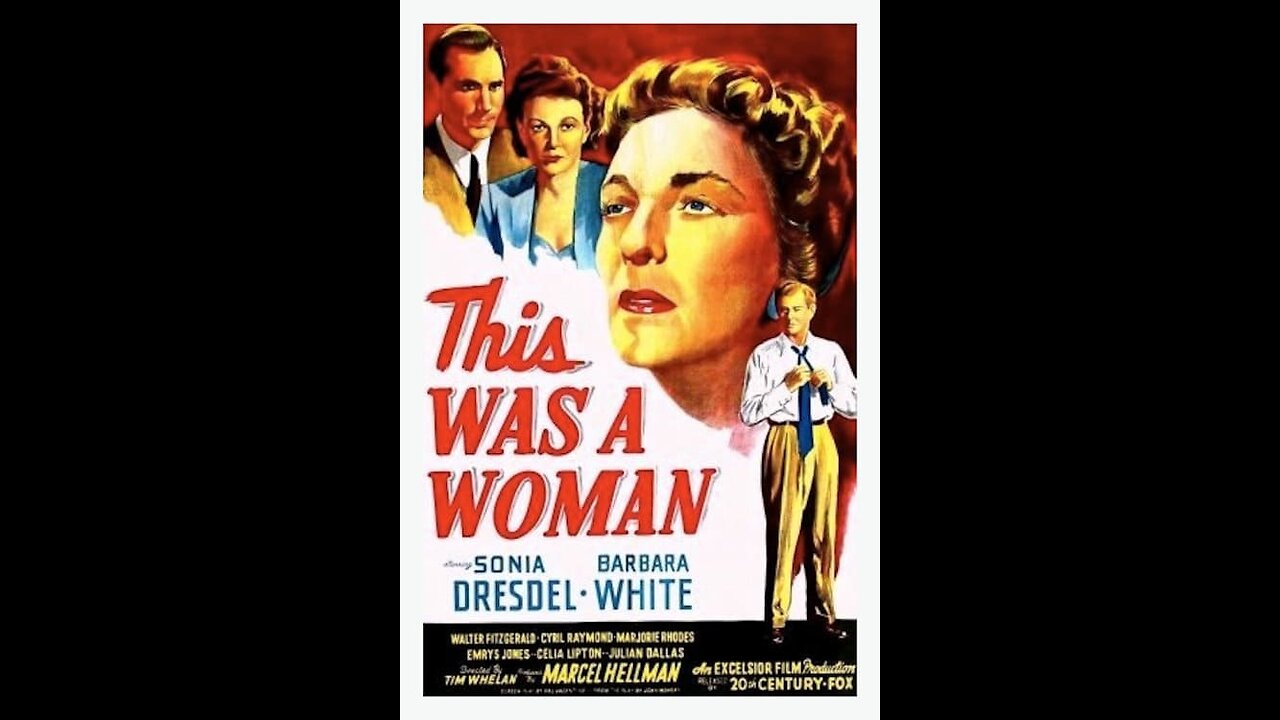Premium Only Content

This Was a Woman (1948) | Directed by Tim Whelan
"This Was a Woman" (1948) is a British psychological thriller directed by Tim Whelan, based on the stage play by Jo Eisinger. The film stars Sonia Dresdel as the chillingly manipulative matriarch Vivien Saxon and Barbara White as her daughter, Pauline. The plot explores themes of control, deception, and the destructive power of hidden malice within the family unit.
The story centers around Mrs. Vivien Saxon (Sonia Dresdel), who on the surface appears to be the perfect wife and mother, but in reality is a calculating woman whose actions lead to betrayal and death. Her carefully constructed image hides a manipulative and controlling personality. As the film progresses, Vivien schemes to maintain her grip over her family, including her husband, children, and household. Her daughter, Pauline Saxon (Barbara White), gradually begins to suspect her mother’s sinister nature, leading to a tense family confrontation as the truth starts to unravel.
"This Was a Woman" is a tense and dark portrait of a matriarch who uses her charm and position to manipulate those around her, crafting a story of power dynamics, control, and the breakdown of trust in the family. The film’s exploration of a toxic female protagonist was unusual for the time, offering a complex and disturbing depiction of domestic manipulation.
"This Was a Woman" is an intriguing example of British post-war cinema, notable for its bold portrayal of a female villain and its critique of domestic power structures. Directed by Tim Whelan, who was known for his work on both sides of the Atlantic in a variety of genres, the film maintains the tension and moral ambiguity that characterized much of his dramatic output.
Sonia Dresdel delivers a standout performance as Vivien Saxon, the central figure of the film’s psychological drama. Known for her intense stage presence and commanding screen performances, Dresdel imbues Vivien with a cold, calculating exterior that hides her darker motives. Her portrayal of the manipulative matriarch drives the film and adds complexity to what could have been a straightforward villain. Dresdel's controlled yet emotionally powerful performance makes Vivien both terrifying and tragically human, earning her critical praise as the film’s strongest asset.
Barbara White, in contrast, plays Pauline with a naiveté that gradually turns into suspicion and fear as she uncovers her mother’s true nature. White’s performance complements Dresdel’s, offering a nuanced portrayal of a daughter slowly coming to terms with the evil lurking within her seemingly perfect family.
The supporting cast, led by Walter Fitzgerald as Henry Saxon, the unsuspecting husband, adds depth to the film’s domestic tensions. Thora Hird as Mrs. Brown provides a lighter counterpoint to the dark proceedings, while Patrick Holt and Joy Shelton round out the cast with solid performances as family members who fall victim to Vivien’s manipulations.
Whelan’s direction emphasizes the film’s stage origins, with much of the tension deriving from character interactions and sharp, dialogue-driven scenes. The film’s pacing allows for the slow build-up of suspense as the true extent of Vivien’s manipulations is revealed. The cinematography, though not groundbreaking, effectively uses shadow and light to create a sense of claustrophobia and unease within the Saxon household.
Upon its release, "This Was a Woman" was well-received for its strong performances and daring subject matter. Sonia Dresdel’s portrayal of Vivien Saxon was widely praised, with critics highlighting her ability to convey both charm and menace in equal measure. Many noted that the film’s focus on a manipulative and villainous woman was a departure from traditional postwar portrayals of women, which typically emphasized nurturing and moral fortitude.
The film’s exploration of dark psychological themes was seen as refreshing in a period dominated by more traditional thrillers and melodramas. However, some critics noted that the film’s pacing was slow in parts, a reflection of its stage play origins. The dialogue-heavy structure, while effective in building tension, was at times seen as limiting the film’s cinematic potential.
Despite these minor criticisms, the film was recognized as an effective and engaging psychological thriller, with particular emphasis on the performances of Dresdel and White.
"This Was a Woman" stands out in the post-war British cinema landscape for its bold portrayal of a female antagonist and its critique of familial power dynamics. The film’s willingness to explore the darker aspects of domestic life, particularly through the character of Vivien Saxon, gives it lasting relevance as an early exploration of psychological and emotional abuse within the family.
While Sonia Dresdel did not become a household name in cinema, her performance in "This Was a Woman" remains a testament to her skill as an actress, particularly in the way she navigates the complexities of Vivien’s character. The film is also notable for its reflection of shifting gender roles in the aftermath of World War II, as women’s roles in society and family life were being reevaluated.
Though not widely known today, "This Was a Woman" remains an intriguing and unsettling film, appreciated by those with an interest in early psychological thrillers and films that challenge traditional gender portrayals.
Full Cast:
- Sonia Dresdel as Mrs. Vivien Saxon
- Barbara White as Pauline Saxon
- Walter Fitzgerald as Mr. Henry Saxon
- Thora Hird as Mrs. Brown
- Patrick Holt as Michael Saxon
- Henry Hewitt as Mr. Travers
- Joy Shelton as Janet Travers
-
 1:01:07
1:01:07
Classic Films & Movies Archive
3 days agoPhantom of Chinatown (1940) | Directed by Phil Rosen
1161 -
 1:10:17
1:10:17
Sarah Westall
3 hours agoWorld Leaders Increasingly Display Panic Behavior as Economic Change Accelerates w/ Andy Schectman
18.7K2 -
 41:57
41:57
BonginoReport
5 hours agoProtecting Kids From WOKE Ideology in School (Ep. 35) - Nightly Scroll with Hayley Caronia -04/25/25
77.6K22 -
 1:15:07
1:15:07
Kim Iversen
1 day agoThe Left Is Dead — What And Who Will Rise From the Ashes?
76.6K56 -
 LIVE
LIVE
Joker Effect
46 minutes agoYOU DON'T UNDERSTAND FREEDOM OF SPEECH IF THIS MAKES YOU MAD!
281 watching -
 LIVE
LIVE
SpartakusLIVE
3 hours agoFriday Night HYPE w/ #1 All-American Solo NUKE Hero
80 watching -
 1:45:26
1:45:26
vivafrei
7 hours agoSantos Sentenced to 87 MONTHS! Corrupt Judges ARRESTED! Some Canada Stuff & MORE!
126K75 -
 4:34:03
4:34:03
Nerdrotic
6 hours ago $20.56 earnedStar Wars GRAPED? Hollywood In Freefall, Silver Surfer is a MAN! | Friday Night Tights 351
84.8K18 -
 1:33:35
1:33:35
Keepslidin
2 hours ago $0.63 earned$5000 START | ROAD TO 100K | Mother.land
23.3K2 -
 1:27:54
1:27:54
2 MIKES LIVE
5 hours ago2 MIKES LIVE #210 Open Mike Friday!
20.4K